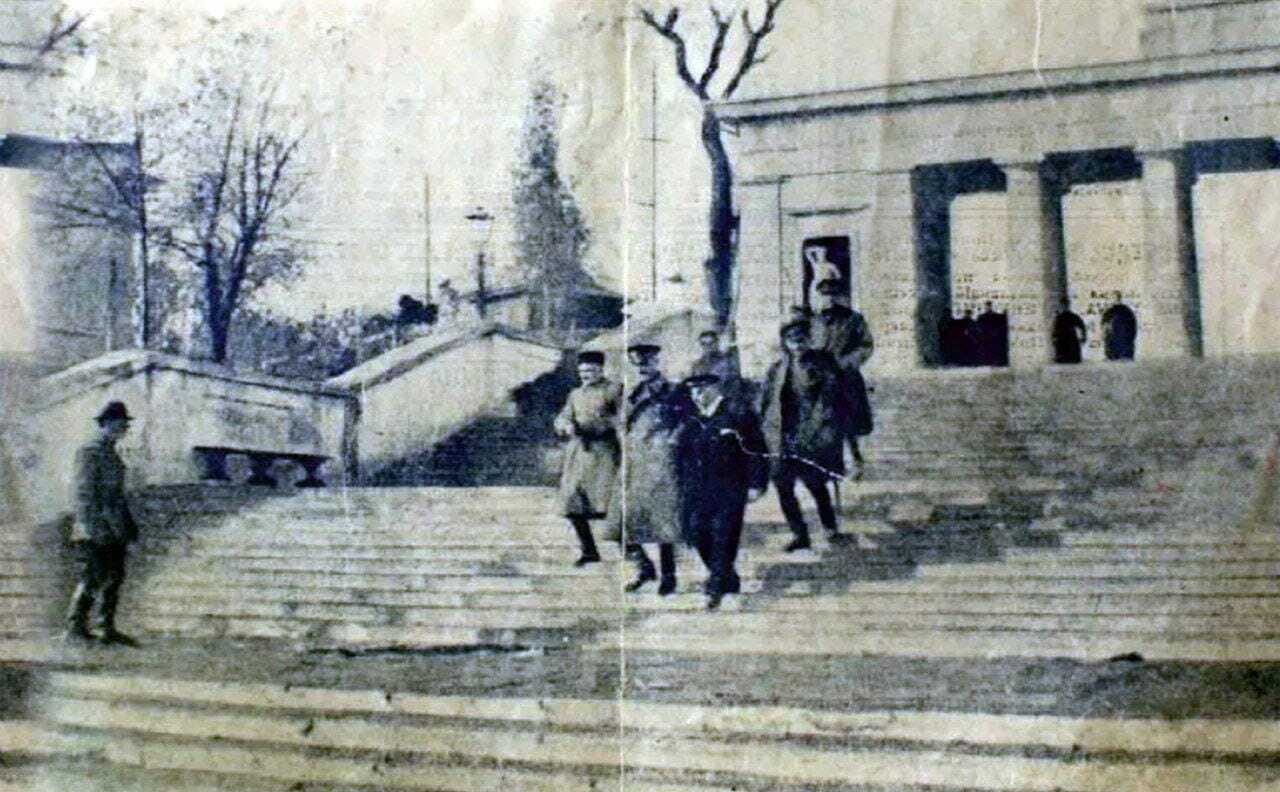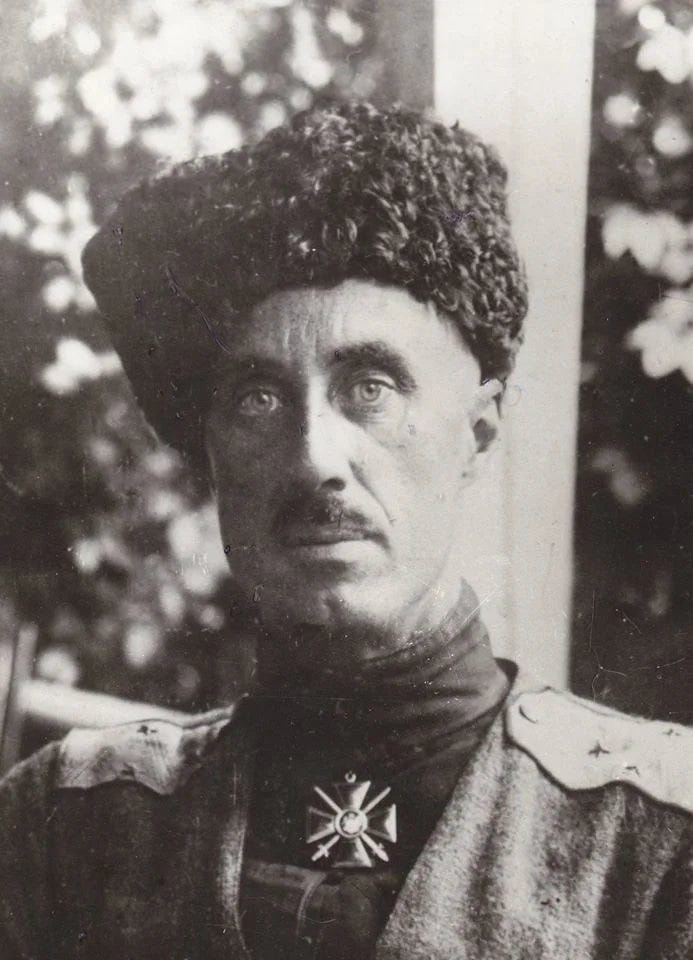General Wrangel explains “Why We Fight”
Greatest of All Time
I just finished the book “Russia: Revolution and Civil War” by Anthony Beevor, who’s also written acclaimed histories of the Spanish Civil War (he provides a pretty good overview of this) and World War 2. Although his book on Russia was merely OK (Beevor does a good job describing battles but his political/social commentary is often very obnoxious), there’s one quote from General Wrangel that Beevor used that really stuck with me.
For those of you who haven’t read General Wrangel’s memoirs, titled “Always with Honor” (now totally out of my and the other former MG staffers’ hands and under the tender care of Passage Press): Wrangel was a conservative military officer who was fired by Russia’s weak liberal government after the Czar was overthrown. A few months later, the communist Bolsheviks launched a coup against the liberals and established a dictatorship in Russia. In retirement, Wrangel barely escaped being murdered by a Bolshevik terror squad, one of many sent around the country to massacre anyone who might oppose them. After this brush with death, Wrangel resolved to try to save his country however he could.
Wrangel joined with the White Army, a fragile alliance of politically incoherent military formations united by their shared opposition to the Bolshevik dictatorship. Although Wrangel was a brilliant commander who won many seemingly impossible victories, the White Army was poorly led and even more poorly managed. Corruption, disorganization, and abuse of civilians was commonplace.
The head of the White Army, General Denikin, made a huge mistake in rushing to directly attack Moscow with his forces in South Russia (where Wrangel was operating) instead of rescuing and uniting with another, weaker, formation of the Whites in Siberia that was led by one of Denikin’s political rivals. Wrangel had begged Denikin to avoid this error.
Denikin’s plan fell apart, the Whites in Siberia were totally annihilated, and a disastrous uncoordinated retreat of Denikin’s forces back into South Russia began. Soon nearly everyone allied with the Whites began to believe that Denikin should be replaced by Wrangel as supreme leader. Not only was Wrangel an undeniably brilliant military commander, but he was also a much more savvy diplomat and politician than Denikin (who had risen to his supreme position mainly due to seniority).
As public pressure grew for Denikin to resign, Denikin took out his frustrations on Wrangel, claiming that Wrangel had been conspiring to undermine him all along. Denikin ordered Wrangel to leave the country on pain of death. Wrangel left Russia with his family and General Pavel Nikolaevich Chatilov (sometimes spelled Shatilov), his longtime chief-of-staff and best friend.
Wrangel had gotten away clean. Unlike many important Russians, he hadn’t abandoned his country in its hour of greatest need. Instead, he had fought what everyone acknowledged was a brilliant and brave campaign. His reputation was impeccable. Also unlike most Russians forced into exile for political reasons, Wrangel had numerous overseas properties and bank accounts. He could start a new life.
But Wrangel just couldn’t let it go. Denikin was soon forced to step down and leave the country in disgrace, abandoning the soldiers of the White Army and the civilians under their protection to their fates at the hands of the advancing Bolsheviks. As Denikin fled, the British (who had been providing the Whites with arms and ammunition) formally withdrew their support for the Whites, hoping to bring the war to as quick an end as possible.
British Admiral John de Robeck, who understood that total victory for the Bolsheviks meant death for hundreds of thousands of White soldiers and civilians, approached Wrangel about replacing Denikin. Admiral de Robeck warned him that, although many members of the British military were still with Wrangel, they could no longer provide him with any official support. Wrangel described the scene:
England's refusal to give us any help in the future robbed us of our last hope. But I had made up my mind.
"Thank you for having warned me, Admiral," I said. "Until this moment I was still hesitating, but now I have no doubts. If I am chosen, it is my duty to accept the command."
Admiral de Robeck, obviously much moved, wrung my hand. I decided to leave the same evening, so went to say goodbye to my family.
Once again I must take the opportunity to mention my wife's moral courage. She was certain that I was going to my doom and that we should never meet again, but she made no effort to detain me; she said only that duty was the most important thing in the world.
Chatilov was overcome with dismay when he heard of my decision. "You know that it is an impossible fight: the Army will either be killed off to the last man, or it will capitulate. You will be dishonored forever afterwards. You have already lost everything except your spotless reputation, it would be madness to lose that too."
But when he saw that my decision was unalterable, he told me that he was coming with me.
After returning to Russia, Wrangel immediately set about reorganizing White forces. He turned the Crimea, the last area of Russia under their control, into a massive fortress while attempting to rescue the scattered remnants of the White Army separated from the main group during Denikin’s devastating retreat.
The effects of Wrangel’s intervention were remarkable. Although the Whites didn’t seem like they would last the month before he took over, suddenly their sector was the most orderly and prosperous in Russia.
In an interview with journalist Vasily Shulgin, Wrangel outlined why he chose to risk everything and come back to Russia when the situation seemed so grim:
If this is the end, then at least it should happen without shame. It was hopeless when I took over command. But I at least wanted to stop this disgrace, this outrage, to go honourably and save what still could be saved. I have to say that I don’t make big plans. I think I need to gain time.
I understand perfectly well that nothing can be done without help from the Russian people. One has to give up the politics of conquering Russia. We used to feel as if we were in a conquered land. It should not be like this. One cannot fight against the whole world, one has to find support somewhere . . . To hold on to a territory, one has to find men right there, and grain.
What am I fighting for? I am fighting to make life possible at least on this small patch of land, in the Crimea. To show to the rest of Russia, so to speak: well, what you’ve got is hunger and the Cheka, while here there is a land reform in progress, regional authorities are being elected, order is being established, and there is freedom. No one is suffocating you, no one tortures you, you can just live. I just want to win time, to start the chapter: to show that one can live in the Crimea. Then we will be able to move forward, not like we did with Denikin, but slowly, securing what we have won. And then the regions that we capture from the Bolsheviks will become the source of our strength, not a weakness like it was before.
Although victory ultimately wasn’t in the cards for Wrangel’s Army, I think Wrangel’s words and outlook in this interview are very applicable to the situation we face today.







We can’t all be as great as Wrangel, in fact most of us never will be.
But we can all be Chatilov. Greatness is getting on the train heading into danger. Are you getting on?
Wrangle's wife reminds me of Empress St. Theodora giving a rousing speech to Emperor St. Justinian during the Nika riots, when Justinian was wavering in his resolve of what to do
"My opinion then is that the present time, above all others, is inopportune for flight, even though it bring safety. For while it is impossible for a man who has seen the light not also to die, for one who has been an emperor it is unendurable to be a fugitive. May I never be separated from this purple, and may I not live that day on which those who meet me shall not address me as mistress."
I know it's cliché to say, but so many great men of history have had these types of iron willed women behind them as a fountain of strength to push them forward. It's very beautiful to see and read about.